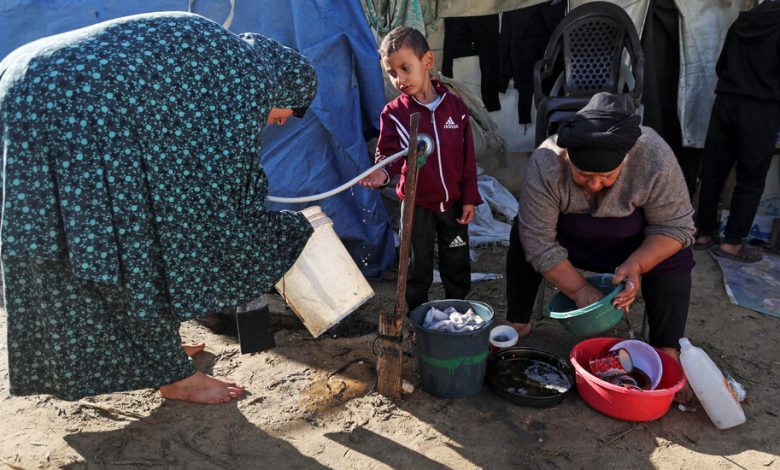‘We Are All Sick’: Infectious Diseases Spread Across Gaza

Infectious diseases are ravaging the people of the Gaza Strip, the World Health Organization said Monday, as more people flee to overcrowded shelters in the south where dire conditions and a scarcity of food and clean water have set off a public health crisis.
Limited sanitation facilities and overcrowding in shelters are causing the spread of disease and keeping people from recovering, said Shannon Barkley, the health systems team lead at the World Health Organization’s offices in Gaza and the West Bank.
The Israeli military announced Monday that it was opening a second security checkpoint at Kerem Shalom Crossing to screen humanitarian aid from Egypt, allowing more food, water, medical supplies and shelter equipment into Gaza. Many aid organizations have said that the rate of aid coming into Gaza since the collapse of a temporary cease-fire earlier in December has been far from enough.
Ms. Barkley said illnesses as common as a cold can pose grave risks to Palestinians, especially children, older adults and the immunocompromised.
Although the collapse of Gaza’s health system has made it challenging to track exact case numbers, the W.H.O. has reported at least 369,000 cases of infectious diseases since the war began, using data collected from the Gaza Health Ministry and UNRWA. These numbers are likely underreported, Ms. Barkley said, as they don’t include cases reported in northern Gaza.
“We are all sick,” said Samah Al-Farra, a 46-year-old mother of 10. “All of my kids have a high fever and a stomach virus.”
Ms. Al-Farra was speaking over the phone on Monday from a camp housing displaced Palestinians in Rafah, where the family has been sleeping on the sand since they fled Khan Younis a week ago. For the last three days, Ms. Al-Farra said, she and her children have had high fevers and have suffered from persistent diarrhea and vomiting.
“This is all because of the water we are drinking and the tent we live in,” she said.
Ms. Al-Farra, like many others in the battered enclave, said they have been drinking the same water that they have been using to wash themselves, and they complained that it smelled foul.
“When I wash my hands, I feel like they get dirtier, not cleaner,” she said.
Her youngest child, 6-year-old Hala, had spent the majority of the last three days sleeping and was too weak to ask for food after weeks of going hungry. “She used to beg for more food, but now she can’t even keep anything down,” Ms. Al-Farra said. Her 9-year-old son, Mohammad, had been having seizures, likely from his fever, she added.
Save The Children, a global charity, warned on Saturday that the unsanitary conditions in overcrowded camps and shelters are a “grave concern for the health of children and families, with diseases such as hepatitis A likely only to worsen as more people are forced into even smaller, crowded areas.”
The Palestinian Authority’s health minister, Mai Alkaila, said last week. that about 1,000 cases of hepatitis A have been recorded in the strip.
People taking refuge in U.N.-run shelters, where several thousand displaced Palestinians have been sharing bathrooms without running water, have been the most vulnerable to diseases. Ms. Barkley of the W.H.O. estimates that 700 people share one toilet in Gaza.
Fecal matter accumulating on the streets can contribute to the spread of disease and further contaminate water sources, Ms. Barkley said.
Malnutrition weakens people’s immune systems and their ability to fight off disease, Ms. Barkley said, and hospitals aren’t equipped to help those who need treatment.
“Bacteria, filth, disease and epidemics are all over the school,” said Firas Al-Darby, 17, who is at a U.N. school-turned-shelter in the south. Mr. Al-Darby added that he has had a fungal infection all over his body for weeks.
Hala Al-Farra also had a skin rash, her mother said, as well as lice. Ms. Al-Farra added that she was considering cutting off Hala’s hair because she cannot afford shampoo.
Dr. Marwan Al-Hamase, the director of Abu Yousef Al-Najjar Hospital in Rafah, said on Sunday that his small facility was accommodating hundreds of displaced people who were sleeping on floors where wounded people were also being treated. Those floors have not been cleaned in weeks, he said, because “we are unable to find cleaning products.”
Aaron Boxerman contributed reporting.
